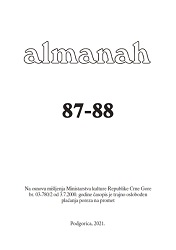
We kindly inform you that, as long as the subject affiliation of our 300.000+ articles is in progress, you might get unsufficient or no results on your third level or second level search. In this case, please broaden your search criteria.



Short stories written by Bešir Ljušković: *Košava *Ribnica *Crveni lišaj
More...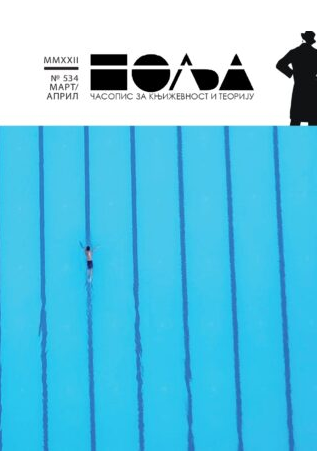

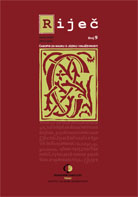
This paper, written in the style of an essay, deals with an unusual phenomenon: denying of the Montenegrin language by the writers who succeeded by writing in it. The author points out the fact that Montenegro has given an eminent group of linguists whose mother language is Montenegrin but who didn’t live and build their carriers in Montenegro and spoke negatively about their mother language.
More...
Chronotopes as an intersections of spatial and temporal chains, represent organizational units of the main events in the novel and they have the crucial significance for making summaries Temporal scheme has been based on the prospective angle following the course of events of progress. The retrospective view comes out directly from the conscince of the figures. The key point of the closer environmental organization of the novel refers to the meaning structure of its medium toponym contained in its very title-Nevidbog
More...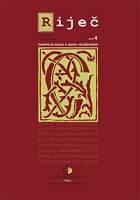
Review of: Zorica Radulović, “Pjesma i žena (iz crnogorskog pjesništva)”, Kolo, Nikšić, 2006, str. 370
More...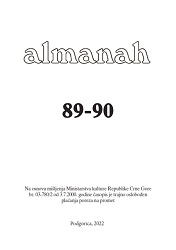


Poems by Beća Kujević: „Zašto pauk spava“, „Sve ima svoju svrhu“, „Tako je, tako je”.
More...
Poems by Redžep Nurović: „Tako mi vremena“, „Velika pjesma“, „Pjesma za nagradu“.
More...
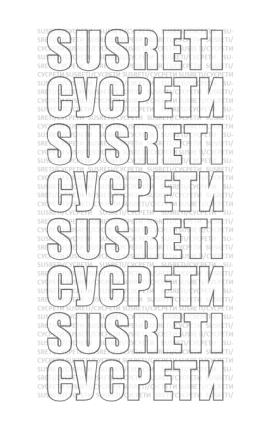
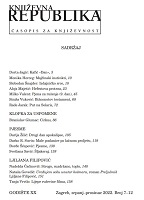
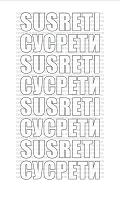
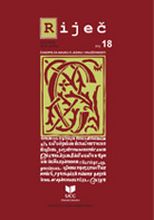
If we define the theme of The Mountain Wreath (Gorski vijenac) as an artistic and literary reconstruction of the Montenegrin socio-cultural code, then the novel The Pursuit (Hajka) could also be understood as a certain selfdescription of the Montenegrin collective personality and, moreover, as a mimesis of identical image of this ethnic group presented in The Mountain Wreath. Finally, The Pursuit becomes the guardian of the archaic message of the prototext ot The Mountain Wreath, not its creator. In this case, the illustrative metatextual pattern becomes a powerful means of mythologizing, canonizing, highly elevated ideas of Montenegrin ethos: ethical-philosophicalmystical system of chivalry and heroism, and most broadly, Montenegrin philosophy of heroism, specific in relation to the notion of heroism in general.
More...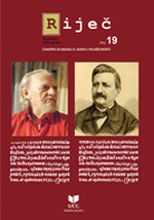
The interpretation of the Biography (1878) of S. M. Ljubiša is aimed above all at those attitudes that are dominantly in the function of reflecting on the poetic system of this famous 19th-century author from Pešter. The author notes that some of the dominant political views may also belong to these views. Therefore, the article is, to the highest degree, devoted to the question of the relationship between the basic concepts of hermeneutics established by Umberto Eco: intentio auctoris and intentio operis, from which relationship intentio lectoris cannot logically be excluded. Hence the importance of a question that can be posed differently as a question about the nature of the relationship between explicit and implicit poetics in Ljubiša's text, and in this particular consideration of their mutual agreement and/or disagreement.
More...
With his poetic and theatrical research, the author continues to search for conceptual solutions that S. M. Ljubiša used in narrative prose, primarily in Pripovijesti crnogorske i primorske. Lјubiša established a strong compositional ring in each type of storytelling, which includes, first of all, the classic stages of a dramatic action: exposition, development part - plot, conflict, climax, ups and downs and denouement. In addition, the writer-playwright enriched the action of each story with a series of data and details about the historical period in question. With the help of a series of details from the lives of the inhabitants of Montenegro and Paštrović, the writer singled out folklore and customs woven into their everyday traditional moral code. In this regard, the heroes of Ljubiša are decorated primarily with positive human qualities - honor, heroism, honesty, consciousness and awareness of morality, as well as a high degree of self-sacrifice and other virtues. At the same time, Ljubiša constantly contrasts the categories of good and evil in a broader sense, and in certain scenes of the drama, the principles of evil and good, violence and kindness, hatred and compassion, crime and forgiveness clash.
More...
The article offers an in-depth analysis of the polemical lyrics written by Jevrem Brkovic, defining it as a special and rare genre. Thanks to his exceptional polemical gift, the poet wrote lyrical texts of high aesthetic quality within this genre, which deserve the status of Montenegrin literature’s anthological works. Polemic lyrics is a special lyrical discourse in which Brković his polemical vocation led to perfection, subordinating it to lyrical coding, which is very productive in an aesthetic sense. Therefore the poet forms a hybrid genre which works as a specific communicative channel, much more complex than the one formed in the case of intimate lyrics: I, the sender of the message, lyrically and polemically coded, and the reader who acts as a recipient. However, the poet, also, includes polemical objects in the process of communication – seen as instances and targets hit by sting of cynicism. The author has, also, identified the necessary to interpret Jevrem Brković's extremely aggressive dialogue with Njegoš's Mountain Wreath, considering the canonical and cult status of that text in Montenegrin literature, as well as to identity the function of Brković's poetry in the Montenegrin identity narrative.
More...